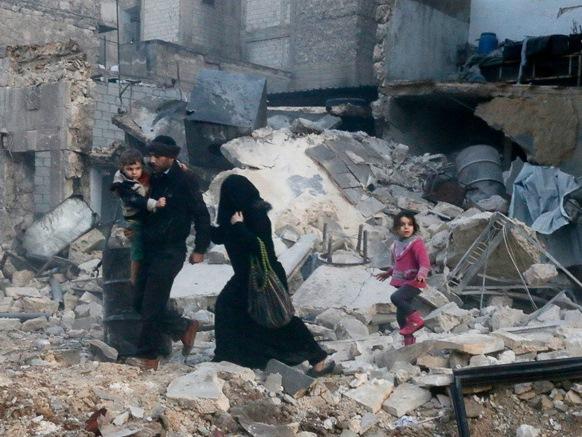It’s easy to dismiss the increasing drumroll of war in London and Berlin as the panic-fueled reaction of madmen who happen to be in power. Yet, the truth might be even more disturbing.
Despite the thousands that went to the streets of London and across the UK shouting “Don’t bomb Syria”, despite the desperate calls from the local population in ISIL-controlled Raqqa “We can’t hide from the bombs.” Despite everything, Europe’s strongest nations go to war.
The German Bundestag and the British Parliament have decided to join the US, France and Russia in their military campaigns in Syria. These campaigns are illegal, one should say, as they do not have any clear backing from the UN and the decisions of national parliaments are irrelevant from the perspective of international law.
Europe is being drawn into another mad spiral of violence in the Middle East that can only play into the hands of Europe’s declared adversary. Hasn’t this been exactly the goal the terror attacks in Paris aimed to achieve? Hence, ISIL won even before the British fighter jets ignited their engines.
The logic of terror hasn’t changed much for decades. Terrorists and guerrilla organisations lack concrete capabilities to engage the military might of political powers on the battlefield. What they can do, instead, is create a bloody and shocking spectacle. The spectacle snowballs by the replicating breakneck-machine of the commercial mass-media. This medial aberration makes the power of terror appear comparable with that of the state.
The shock of the spectacle is polarising. It destroys both the grey zone of coexistence and the very grey zone where politics itself belongs. It does so by turning the political struggle into an ethical one – that of good against evil. And, in that kind of struggle, everybody is a “radical” – both symbolically and concretely.
The law-abiding and tax-paying citizens of France and Russia, and now also of Great Britain and Germany, thus become the symbolic supporters of the West’s bombardment campaigns, supporting every inevitable death of innocent civilians in Syria with her or his own salary. Europe’s military campaigns in Syria are radically mad, as their sole strategy seems to be one of acting out: “We have to do something.”
After the disastrous attempts in Afghanistan, Iraq and Libya, starting another war should seem like a mad obsession to just about anybody. It’s also mad as it is based on no concrete strategy, no diplomatic plan, no reliable allies on the ground, as the leader of the opposition Labour Party Jeremy Corbyn claims. And yet, here we go again.
“What else can one do against terror?” Well, thinking could finally replace knee-jerk reactions, but the former is much less appealing both for media outlets as a news product and for politicians.
A good place to start is seriously questioning our partnerships in the region. So far, Europe has been too tolerant for much too long towards the discrete support of fundamentalism by several of its allies – among others Saudi Arabia and Turkey. And now – as if adding insult to injury – France is also embracing Russia who openly supports the Assad regime which has killed 7 times as many civilians as ISIL. Yet again, commanding fighter jets is both easier and more profitable than the commissioning of diplomats both for the media and for politicians.
The result: more civilian deaths, more destroyed infrastructure, and, thus, more people without an imaginable future on the ground in the Middle East. If we’re lucky, that will turn them into refugees heading for our borders. If we’re less lucky, they will become concrete radicals who will shift their imaginable future from here to the Beyond, become ready to launch themselves into that heavenly future by means of an explosive belt in our midst.
Bombs cannot destroy an idea – any idea, not to mention the radical ideas in the Middle East. It feels silly to repeat that. Yet, the shootings and explosions in Paris seem to have destroyed any rational thinking here in Europe. And bombardments as the only imaginable solution reveal the disturbing lack of ideas that governs the continent.
European like to think that only despotic regimes – like Mr. Putin’s – are capable of calculatedly using war for political profit. It would be hard to admit the same thing about our own democratic leaders. Yet, the support for Hollande and Merkel also predictably rises with each cycle of violence. Do our mass-medialized democracies really perform much better than Putin’s propaganda-driven state?
In the face of the growing power of global capital and global financial markets, the nation-state can do increasingly little. Few nations can prevent a big corporation from bringing their economies to the brink of disaster by moving production abroad. Many nations keep that from happening only by succumbing to blackmail and offering ridiculously generous tax breaks.
Going to war and managing economic crises could thus be the few remaining areas of decision-making over which national governments still have some degree of control. And it makes our politicians appear more useful. And they need to appear just that; without that legitimacy, they too have no imaginable future.
What if the madly futile attempt of bombing terrorist ideas overseas are but a calculated PR-strategy of European politicians? After all, the message that they intend to broadcast to Syria might only come over as half-self-persuasive and half-remorseful “Look what you made me do.” But what if the primary addressees are their voters at home and the actual message is “Look, we can finally do something”?



